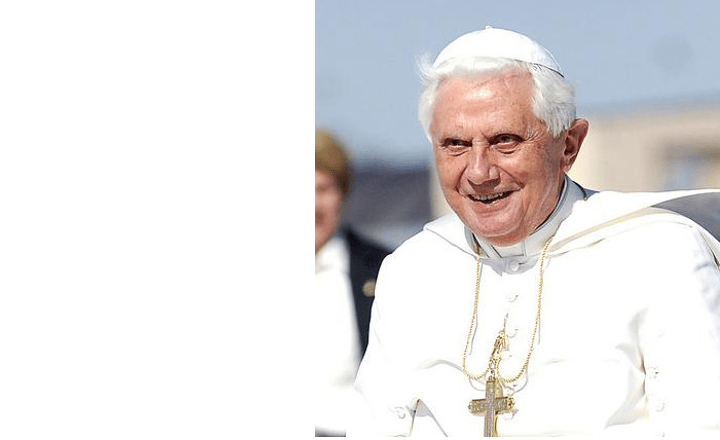Catholic League president Bill Donohue defends the decision by Pope Emeritus Benedict XVI not to apologize for decisions he made before he was elected pope:
People who apologize for offenses they never committed—such as white people who apologize for being white—are either phonies or psychotic.
That is why it is so refreshing to learn that Pope Emeritus Benedict XVI is not apologizing for offenses he never committed while serving as archbishop of Munich and Freising from 1977 to 1982.
In a letter Benedict released today, he offered his “deepest sympathy” to the victims of clergy sexual abuse, saying he feels “great sorrow for each individual case.” But he did not offer a personal apology, and that is because none was warranted.
In an appendix to his letter, Benedict did, however, provide a much-needed rebuttal to accusations made against him by a Munich law firm; it had been commissioned by the archdiocese to examine accusations of sexual abuse that occurred between 1945 and 2019. He was assisted in this endeavor by some of his supporters.
Benedict takes issue with three outstanding accusations; they form the basis of the charges against him.
The first issue deals with Priest X (Peter Hullermann).
Two weeks ago, in his preliminary response, Benedict admitted that he erred when he claimed in his memorandum, drafted in response to the law firm, that he was not present at a meeting on January 15, 1980 in which this priest was discussed. He offers a lengthy, and pointed, commentary explaining how his collaborators made an honest mistake.
One of them, Dr. Stefan Korta, inadvertently made a transcription error noting that Benedict (then Cardinal Joseph Ratzinger) was not present at the meeting. He clearly was. In fact, the minutes show that he spoke at the meeting. But to call this a “lie” is malicious.
More important is what transpired at the meeting. The records show that the discussion did not revolve around sexual misconduct committed by the young priest. It focused on a request for therapy, which was granted. That is the sum of it. It is therefore scurrilous to charge that Benedict lied about the meeting.
The second issue is based on charges that Benedict did not act properly in handling the other three cases. The charges are false. Not only does Benedict dispute accusations that he knew of sexual abuse committed by these priests, the law firm report “provides no evidence to the contrary.”
Benedict is unequivocal in his response. “The expert report contains no evidence for an allegation of misconduct or conspiracy in any cover up.” Indeed, if the law firm had proof, it would have provided it. It does not.
The third issue claims that Benedict minimized acts of exhibitionism. In fact, this is patently false. In his memoir, Benedict notes that abuse, including exhibitionism, are “terrible,” “sinful,” “morally reprehensible” and “irreparable.” In other words, he clearly condemned such behavior.
I need to clarify something. In my news release of January 25 on this subject, I accepted the accusation that Benedict downplayed exhibitionism, saying, “he did not treat him [the priest in question] the way he should have. He should have seen this as a red flag—normal men don’t act that way.”
I was wrong to accept this accusation at face value—Benedict never sought to make light of exhibitionism. I apologize for doing so.
There are fair-minded critics of Benedict, but there are also many who are ruthless. They have hated him ever since he headed the Congregation for the Doctrine of the Faithful, enforcing the Church’s moral strictures.
Consider the reaction to a homily he gave on April 18, 2005. In an address before the College of Cardinals, who had assembled to elect a new pope, he spoke forcefully about the “dictatorship of relativism” that had engulfed the West.
Georgetown professor E.J. Dionne condemned Cardinal Ratzinger for using “fighting words.” Fr. Richard McBrien from Notre Dame said, “I think this homily shows he realizes he’s not going to be elected.” New York Times reporter Peter Steinfels announced, “Oh well, that gets rid of him.”
The next day he was elected pope.
As I said in my new book, The Truth About Clergy Sexual Abuse, “No one has understood why the clergy sexual abuse scandal took place better than Pope Emeritus Benedict XVI.” That is largely because he correctly noted the effect of the sexual revolution on the Church, and the huge role played by homosexual priests.
I also said that he “does not get the credit he deserves for the actions he took. Quite frankly, no pope in the modern era worked to punish predator priests more than Benedict.” For example, when he was a cardinal, he pressed for a “more rapid and simplified penal process” in dealing with abusive priests.
More important, he defrocked a record number of molesting priests. Indeed, he not only removed the unrepentant serial predator, Fr. Maciel, from ministry, he did not hesitate to accept the resignation of former cardinal Theodore McCarrick when he turned seventy-five, the earliest possible date for him to do so.
Pope Benedict has nothing to apologize for. If anything, it is his vicious critics who owe him an apology.







